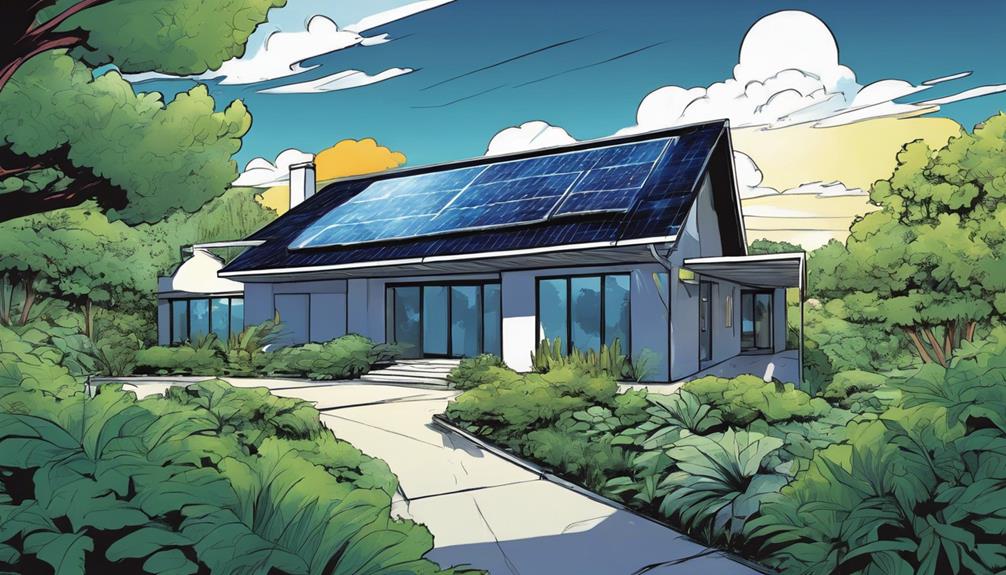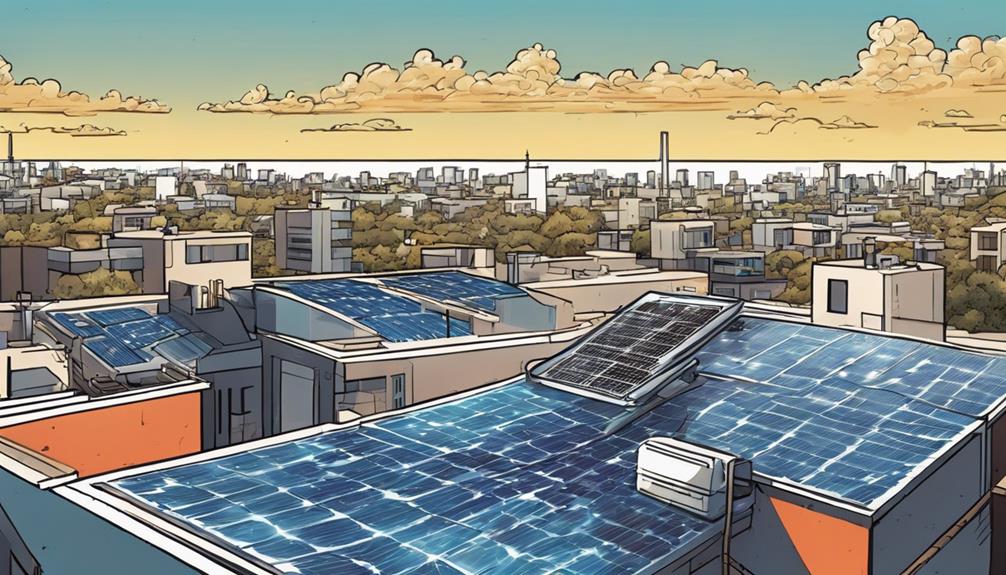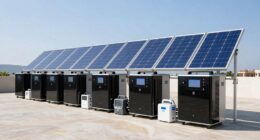Solar energy is a viable alternative resource because it's renewable, eco-friendly, and cost-effective. It reduces greenhouse gases and can be used in various ways. Despite initial costs, long-term benefits and home resale value make it a smart investment. With advancements in storage technologies, it guarantees reliable power supply. Solar power aids sustainable development and combats climate change. Its future is promising with global capacity expansion and smart grid integration. Its applications are convenient, from rooftops to water heating. The sun's abundance and positive impact on carbon footprints make it a secure energy choice.
Key Takeaways
- Renewable nature reduces reliance on finite resources.
- Cost-effective with long-term financial benefits.
- Significant reduction in greenhouse gas emissions.
- Technological advancements drive down production costs.
- Supports sustainable development goals globally.
Solar Energy Advantages
Solar energy's benefits make it a compelling choice for sustainable power solutions. The use of solar energy systems has proven that solar energy is a viable and efficient alternative. By harnessing the sun's rays, solar power offers a renewable resource that's abundant and globally accessible. This not only reduces reliance on finite fossil fuels but also helps in the fight against climate change by lowering greenhouse gas emissions.
Additionally, the environmentally friendly nature of solar energy, with no harmful emissions produced during operation, contributes significantly to a cleaner planet. Another key advantage of solar energy systems is their low maintenance costs, making them a cost-effective option in the long term and promoting energy independence.
The versatility of solar energy, from heating to electricity generation and water heating applications, showcases its practicality in various settings. By adopting solar power, individuals and communities can actively reduce their carbon footprint and play a pivotal role in shaping a sustainable future.
Solar Energy Disadvantages

You'll find that the high initial installation costs and the location-specific efficiency limitations are significant disadvantages of solar energy. These factors can make it challenging for some to adopt solar power as their primary energy source.
It's important to take these drawbacks into account when evaluating the feasibility of solar energy for your home or business.
Costly Initial Installation
It's worth mentioning that for many homeowners, the substantial upfront costs associated with installing solar energy systems can present a significant financial hurdle. The initial installation costs for solar panels typically range from $15,000 to $25,000 for a typical residential system.
Despite these expenses, various governments and organizations offer financial incentives, tax credits, and rebates to help offset the initial investment and make solar energy more affordable. The return on investment for solar energy systems generally falls between 5 to 20 years, influenced by factors like energy consumption, local electricity rates, and available incentives.
While the upfront costs may seem high, solar panels have low maintenance expenses over their 25-year lifespan, requiring minimal upkeep beyond occasional cleaning and inspections. Additionally, community solar projects provide an alternative for individuals who can't install panels on their property, enabling them to benefit from solar energy without the upfront costs associated with individual installations.
Location-Specific Efficiency Limitations
Considering the location-specific factors that can impact solar energy efficiency, it becomes clear that not all areas are equally suitable for maximizing the potential of solar installations. Solar energy production can be notably affected by variables such as sunlight intensity, duration, and weather patterns.
Regions with frequent cloud cover or limited sunlight may experience lower efficiency in harnessing solar energy. Shading from nearby buildings or trees can also hinder the effectiveness of solar panels in certain locations. Additionally, the angle and orientation of a roof play an important role in determining the efficiency of solar panels in capturing sunlight.
These location-specific limitations underscore the importance of conducting thorough site assessments before installing solar systems to ensure best performance. Understanding how these factors influence solar energy efficiency is crucial for making informed decisions about the feasibility of solar installations in different geographical areas.
Solar Energy Economics

With its long-term financial benefits and cost-effectiveness, solar energy economics emphasizes the practicality and sustainability of utilizing solar power systems.
Solar panels, lasting an average of 25 years, offer extended financial gains.
The ease of installation and maintenance of solar energy systems contributes to their cost-effectiveness.
Additionally, integrating solar energy can boost a home's resale value, providing a return on investment.
The low maintenance costs associated with solar panels can lead to significant savings on electricity bills over time.
Such advantages underscore the financial viability and long-term sustainability of solar power systems.
Solar Energy Storage

Advances in battery technology are revolutionizing the efficiency and reliability of solar energy storage, addressing the challenge of low solar energy days.
Here are some key points to keep in mind when it comes to solar energy storage:
- Lithium-ion batteries have emerged as a game-changer, providing increased power capacity at a reduced cost for storing solar energy efficiently.
- New technologies such as flow batteries are on the horizon, offering the potential for scalable and long-lasting energy storage solutions for solar systems.
- Despite their benefits, batteries remain one of the more costly components of a solar energy setup, impacting the overall economics of solar power generation.
- Efficient solar energy storage solutions play an essential role in mitigating the temporary decline in energy production during inclement weather, ensuring a reliable and uninterrupted power supply for your solar energy system.
Environmental Impact

Solar energy's environmental impact is significant, benefiting the planet in various ways. By reducing greenhouse gas emissions and minimizing reliance on fossil fuels, solar power plays an essential role in mitigating climate change impacts. The table below highlights the positive environmental effects of solar energy:
| Environmental Impact of Solar Energy | ||
|---|---|---|
| Reduces greenhouse gas emissions | Minimizes air and water pollution | Conserves natural resources |
| Mitigates climate change impacts | Supports sustainable development |
Solar energy not only helps in combating climate change but also contributes to cleaner environments by reducing pollution. Additionally, by harnessing renewable energy from the sun, solar power promotes sustainable development, ensuring clean and environmentally friendly power generation. With its various environmental benefits, solar energy emerges as a crucial alternative energy resource for a greener future.
Benefits of Solar Energy
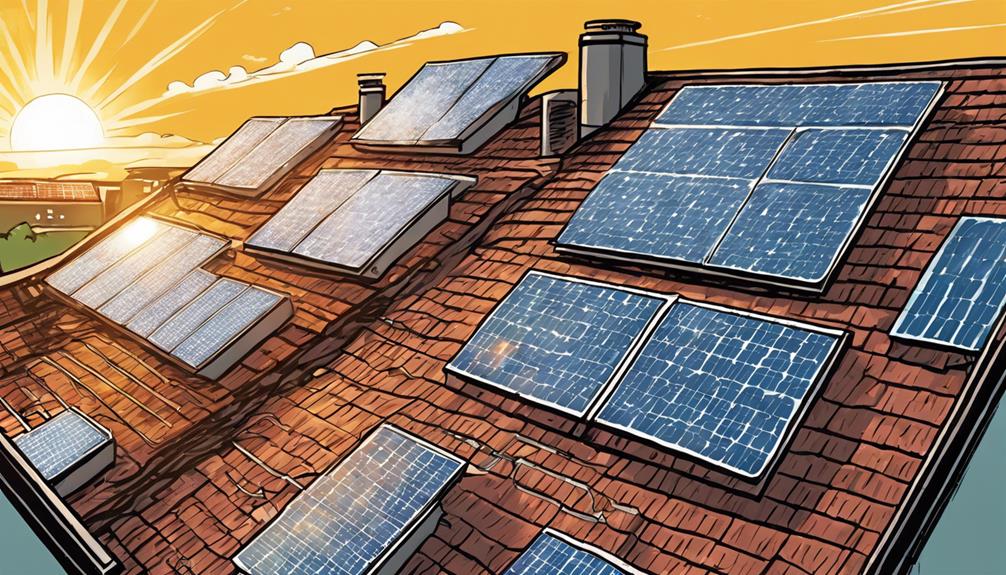
You'll be pleased to learn about the benefits of solar energy. Solar energy provides numerous advantages, such as reducing greenhouse gas emissions and promoting a cleaner environment.
Its future prospects are promising, offering sustainable solutions for energy needs.
Solar Energy Advantages
Harnessing the power of the sun offers numerous benefits that make solar energy a compelling choice for sustainable energy solutions. Here are some advantages of solar energy:
- Renewable Resource:
Solar energy is a renewable and abundant resource that will never run out, providing a sustainable energy solution for the future.
- Environmental Friendliness:
It helps reduce greenhouse gas emissions and is environmentally friendly, contributing to a cleaner and healthier planet.
- Cost-Effectiveness:
Solar systems have low maintenance costs, making them cost-effective in the long run and a smart investment for homeowners.
- Versatility:
Solar energy has diverse applications, including heating, electricity generation, and water heating, offering versatility in meeting energy needs.
Environmental Impact
By utilizing solar energy, you contribute to a cleaner environment and a healthier planet through the reduction of greenhouse gas emissions and pollution. Solar power notably decreases carbon emissions by providing a sustainable alternative to fossil fuels. This decrease in greenhouse gases helps combat climate change and its harmful effects on the environment.
Additionally, solar energy minimizes air and water pollution compared to traditional energy sources, leading to improved air quality and ecosystem health.
Moreover, by harnessing solar power, you actively participate in conserving natural resources and protecting biodiversity. This renewable energy source plays a crucial role in sustainable development by promoting energy independence and reducing reliance on finite fossil fuels.
Embracing solar energy not only benefits the environment but also contributes to a more sustainable and resilient future for generations to come.
Future Prospects
As solar energy continues to advance technologically, its future prospects promise significant benefits for global energy sustainability and independence.
Here are some key reasons why solar energy holds a promising future:
- Cost-Effective Solutions: Continued innovations in solar technology are driving down costs and increasing efficiency, making solar energy more accessible for widespread adoption.
- Global Expansion: Projections indicate a substantial rise in solar energy capacity worldwide to meet the increasing energy demands, indicating a bright future for solar installations.
- Grid Integration: The integration of solar power into smart grids is enhancing grid stability and reliability, contributing to a more resilient and sustainable energy system.
- Contribution to Sustainable Development Goals: Solar energy is poised to play a significant role in achieving sustainable development goals by reducing carbon emissions and combating climate change, thereby promoting a greener future for all.
Solar Energy Applications
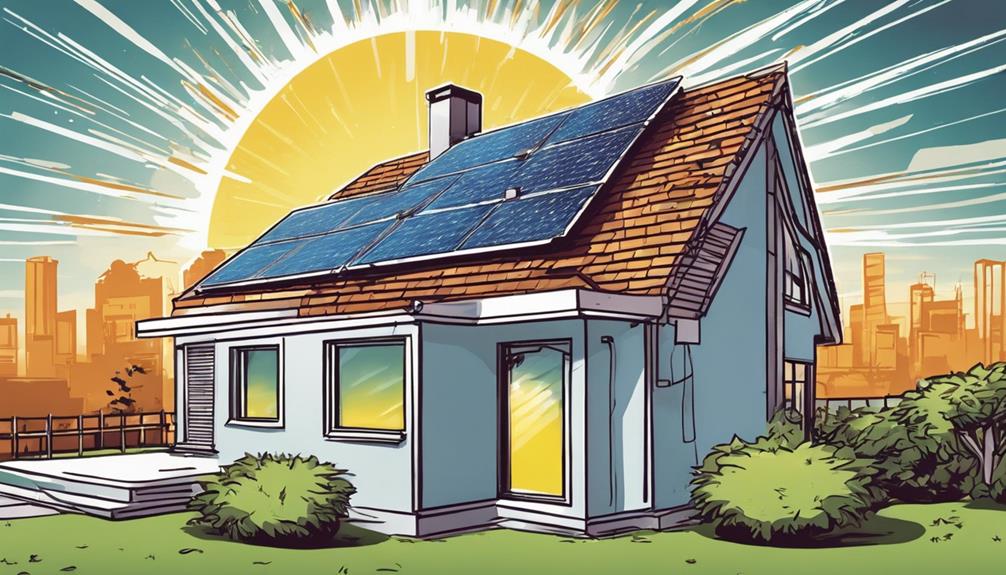
Solar energy applications offer a versatile and sustainable solution for powering various devices and systems. Solar panels are commonly used to generate electricity, with solar energy plants contributing significantly to energy independence. These applications allow for the harnessing of clean energy, reducing reliance on traditional grid electricity and promoting sustainability. Solar panels can be easily installed on rooftops, providing convenient access to renewable energy sources. Moreover, solar energy is not limited to electricity generation; it can also be utilized for heating water in homes, enhancing overall energy efficiency. By incorporating solar energy applications, individuals can reduce energy bills and contribute to a greener environment in residential settings.
| Solar Panels | Energy Plants |
|---|---|
| Convenient access | Significant energy independence |
| Rooftop installations | Contribution to clean energy generation |
| Powering devices | Sustainable electricity production |
| Energy efficiency | Reduced reliance on traditional sources |
Reasons for Viability

To understand why solar energy is a viable option, consider the technological advancements in panels, batteries, and grids that have greatly improved its efficiency and reliability.
Here are some reasons for the viability of solar energy:
- Renewable Energy Achievements: States like California have demonstrated that it's possible to achieve nearly 100% renewable energy on their grids, showcasing the reliability of solar power.
- Reduced Reliance on Non-Renewables: Solar power is effective in reducing our dependence on non-renewable energy sources like coal and oil, contributing to a more sustainable energy mix.
- Abundance and Sustainability: Solar energy is abundant and free, drawn from an infinite source – the sun. This makes it a sustainable choice for the future, ensuring long-term energy security.
- Positive Environmental Impact: Shifting to solar power can positively impact efforts to reduce carbon footprints, contributing to a cleaner and greener planet.
Challenges in Adoption

You face challenges in adopting solar energy due to higher costs compared to traditional power sources and industry resistance stemming from established infrastructure and investments.
Additionally, the need for improved energy storage solutions is essential to address the intermittency issues associated with solar power generation.
Overcoming these obstacles is vital for maximizing the adoption of solar energy and moving towards a more sustainable energy future.
Adoption Cost Challenges
Overcoming the initial higher costs compared to traditional fossil fuel power plants poses a significant challenge in the widespread adoption of solar energy.
When considering the adoption cost challenges of solar energy, several key factors come into play:
- Economic Viability: The upfront costs of installing solar panels and associated equipment can be substantial, deterring some individuals and businesses from investing in solar energy systems.
- Return on Investment: Despite long-term savings on energy bills, the time it takes to recoup the initial investment in solar technology can be a barrier for many potential adopters.
- Financial Incentives: Limited access to government incentives and subsidies for solar energy adoption may hinder progress in shifting to renewable energy sources.
- Cost-Competitiveness: Achieving cost-competitiveness with traditional energy sources remains a challenge for the solar industry, impacting its widespread adoption potential.
Industry Resistance Obstacles
Addressing industry opposition obstacles is essential in facilitating the widespread adoption of solar energy as a viable alternative energy source.
Some industries resist shifting to solar energy due to their heavy reliance on traditional fossil fuel power sources. The challenges faced in moving these industries towards solar energy are primarily related to the required infrastructure and operational changes.
Opposition to change from well-established methods and technologies poses a significant obstacle to the broader acceptance of solar energy. Overcoming industry resistance demands addressing concerns about the reliability, scalability, and cost-effectiveness of solar energy compared to fossil fuels.
To navigate these obstacles effectively, collaboration among policymakers, industry leaders, and renewable energy advocates is pivotal. By addressing industry opposition and promoting the advantages of solar energy, the path towards a more sustainable energy future can be paved with greater ease.
Energy Storage Solutions
Energy storage solutions pose a significant challenge in the adoption of solar energy due to the intermittent nature of sunlight. When considering energy storage for solar power, several key factors come into play:
- Intermittent Sunlight: The variability in sunlight exposure requires efficient storage solutions to guarantee a consistent energy supply.
- Battery Technology Advancements: Advances in battery technology, particularly in lithium-ion batteries, are helping to overcome the challenge of storing solar energy for use during low sunlight periods.
- Cost Considerations: The cost of batteries remains a significant factor impacting the overall expenses of a solar energy system, influencing its widespread adoption.
- Emerging Technologies: Technologies like flow batteries show promise for providing scalable and durable energy storage solutions for solar systems, offering alternatives to traditional lithium-ion batteries.
Innovations in energy storage, particularly in the domain of batteries, play a vital role in making solar energy a more viable and reliable alternative energy resource.
Future Prospects

Technological advancements in solar energy are paving the way for an exciting future filled with growth and potential. Continued innovations in solar energy are driving down costs and improving efficiency, making solar power an increasingly attractive option for energy production. The global capacity for solar energy is projected to expand notably in the coming years, indicating a shift towards cleaner and more sustainable energy sources. Integrating solar power into smart grids enhances energy distribution and management, enabling a more reliable and efficient energy system. By reducing dependence on traditional energy sources, solar energy plays a pivotal role in achieving energy independence and sustainability goals.
To provide a visual representation of the future prospects of solar energy, let's explore the key benefits in the table below:
| Future Prospects of Solar Energy | |
|---|---|
| Cost Reductions | Continued technological innovations driving down the cost of solar energy production. |
| Global Expansion | Significant growth expected in the global capacity for solar energy in the near future. |
| Smart Grid Integration | Enhancing energy distribution and management through the integration of solar power. |
| Sustainable Development Goals | Contributing notably to the world's sustainable development goals. |
Frequently Asked Questions
Why Is Solar Energy a Viable Alternative Energy Source?
Solar energy shines as a viable alternative for numerous reasons. It offers clean power, cost savings, and aids in reducing the carbon footprint. Despite challenges, its potential to replace fossil fuels remains strong, thanks to technological advancements.
Why Is Solar Energy a Viable Alternative Energy Source Brainly?
When considering why solar energy is a viable alternative, think about how it's a top renewable choice. Did you know solar panels can convert sunlight into electricity at an efficiency rate of around 15-22%? Amazing, right?
Why Is Solar Energy a Viable Alternative Energy Resource in Quizlet?
Solar energy is a vital alternative because of advancements in technology and its abundance. It can power entire grids sustainably. Despite initial costs, it offers long-term savings and environmental benefits. Storage solutions and renewables are essential.
Why Is Solar Energy a Good Resource?
Solar energy is a good resource because of its abundance and sustainability. It reduces emissions, lowers maintenance costs, and offers versatile energy solutions. By promoting independence from fossil fuels, solar power contributes to a more sustainable future.
Is Solar Energy the Most Sustainable Source of Energy?
When considering a renewable source of energy not solarbased, it’s important to weigh the potential sustainability of each option. While solar energy is a widely recognized sustainable choice, other options like wind, hydro, and geothermal energy also offer long-term benefits. It’s essential to consider various factors before determining the most sustainable source of energy.
Conclusion
To sum up, solar energy is a viable alternative energy resource due to its numerous advantages, including being environmentally friendly and cost-effective.
Did you know that in 2020, the global solar energy capacity reached 760 GW, making it one of the fastest-growing sources of renewable energy?
With continued advancements in technology and increasing awareness of the benefits, solar energy is poised to play a significant role in meeting our future energy needs.



